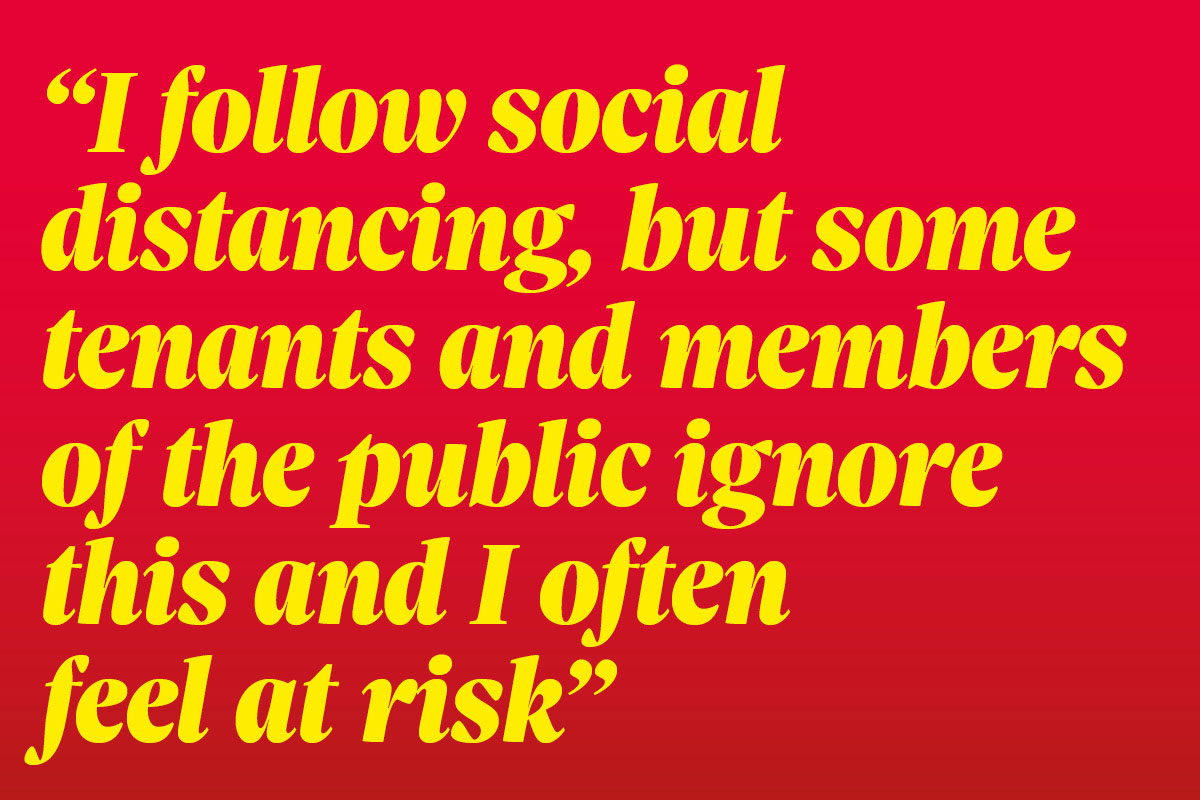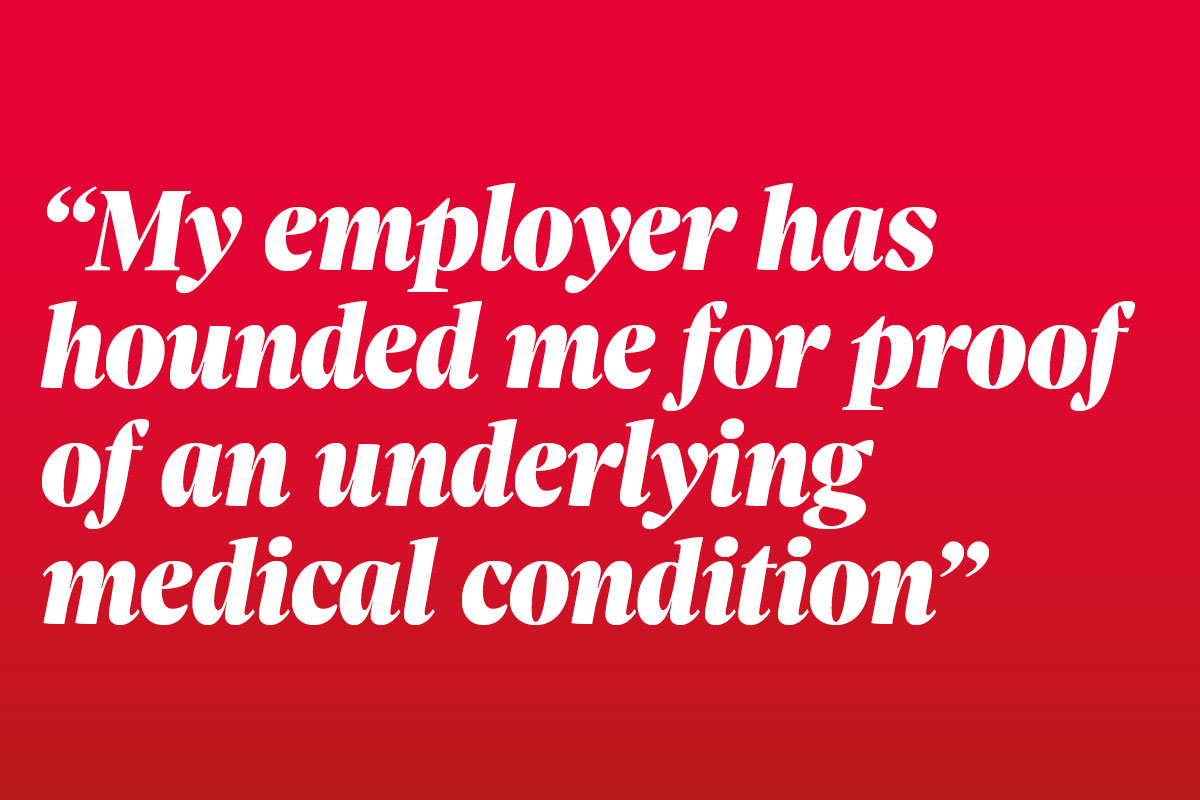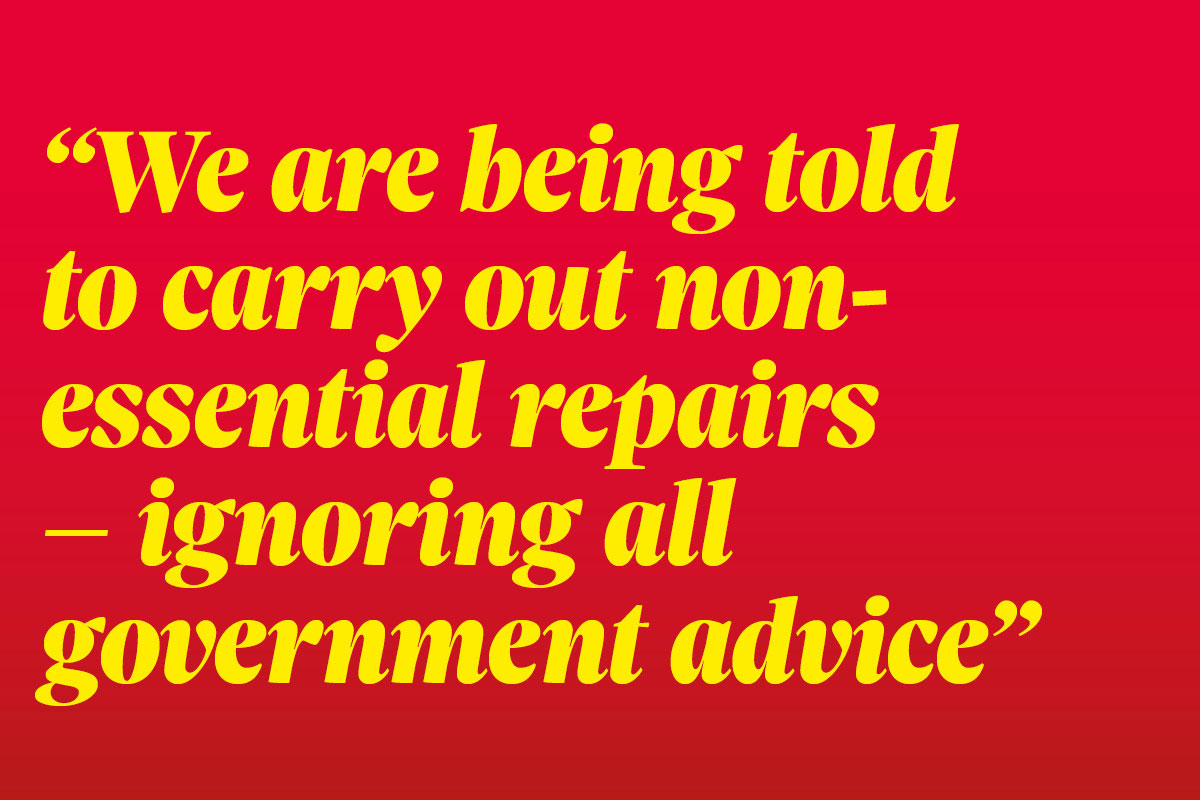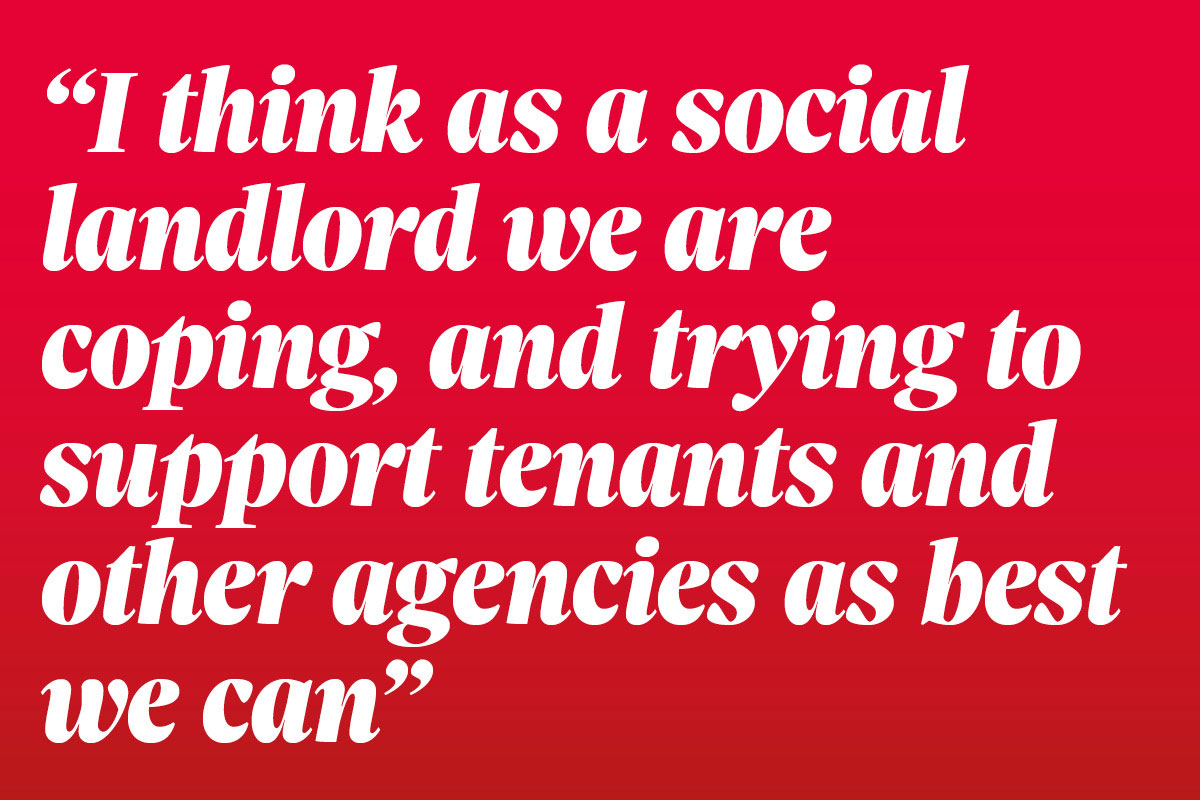You are viewing 1 of your 1 free articles
Inside Housing survey: how housing professionals view the coronavirus response
How well are social landlords responding to COVID-19? Inside Housing asked the housing professionals who work for them. Jess McCabe reports the results
“Why do housing associations think that housing officers still need to make visits, putting us on the frontline, risking our safety while they make decisions sat at home away from the firing line? We are not doctors or nurses.” This is a comment by one housing officer working at an unnamed housing association.
Here is another comment from a council housing director: “I am very proud of how my organisation has responded. Local authority staff are quite unique and just get the job done. I am proud to work in this sector, doing our utmost to support those who are vulnerable, older and struggling either financially or emotionally during this time.”
You could not come up with two more different comments about the same situation. Both came in as responses to an anonymous survey of housing professionals carried out by Inside Housing, which revealed huge differences in how staff are experiencing the crisis.
“I think as a social landlord we are coping, and trying to support tenants and other agencies as best we can – fairly successfully, if I am honest about it”
Ninety-five people responded. They included chief executives of associations, many housing officers, service managers in local authorities, and gas safety managers. As well as tradespeople, policy officers and people who work in homeless hostels. This is a much broader range of jobs than those who have typically been talking to the press about the impact coronavirus has had on our sector. And, as the comments above show, the results reveal a much more mixed bag.
Let’s begin with the good stuff: the overwhelming number of people were positive about how their organisation has responded to the crisis. Just under half told Inside Housing that their organisation is responding “very well”, and another quarter said “reasonably well”.
“I think as a social landlord we are coping, and trying to support tenants and other agencies as best we can – fairly successfully, if I am honest about it,” one tenancy enforcement caseworker put it.
“I got threatened with disciplinary action for working from home”
Still, that leaves one in four who said there is room for improvement with their organisation’s response and said that there are either some problems or that things are going “badly”.
When it is bad, it is very bad. For example, take this housing professional who works in asset management: “I got threatened with disciplinary action for working from home when I was able to.
I also got pressure to make staff in at-risk groups do visits. Hence, I ended up calling in sick with worry.”
Some of the most concerning responses suggest that some landlords are breaking government instructions to avoid all but emergency repairs. “We are being told to carry out non-essential repairs and [on] empty properties – ignoring all government advice,” one tradesperson said.
A gas engineer said: “My employer has supplied limited PPE [personal protective equipment] and told the engineers to carry on as normal.”
“I cannot visit vulnerable customers who need one-to-one visits”
Notably, of the social landlord chief executives who filled out the survey, all rated their organisation as doing either “very” or “reasonably well”. Those who were critical were almost all in positions working directly with tenants.
Half of those who filled out the survey said there has been “some disruption” to services that tenants or customers receive, with another 40% saying there has been “significant disruption”. Of course with significant lockdown measures in place, this is to be expected.
Only four respondents said that essential services were not being carried out. Another three – perhaps just as worryingly – told us it is “business as usual”.
Working from home and safety
The lockdown has had dramatic impacts on working life. Most respondents were happy with how their organisation communicated to them how these changes would affect their work and safety (see pie chart, below).
Eighty per cent said they had been able to carry out most or all of their usual duties. However, some said they have been moved to other work and others explained they should be moved but this has not happened.
This has not always been easy for staff. “I cannot visit vulnerable customers who need one-to-one visits,” one person responded. “Obviously our focus is on responding to the ever-changing landscape we find ourselves in, so my day is consumed with ensuring we deliver the best service possible to our tenants during the crisis,” explained another.
“All staff in a vulnerable group have been sent to work from home for 12 weeks, even if there is little they can do at home”
For a minority of responses, there is a sense of things going awry. One person said that gas engineers have refused to carry out safety inspections, meaning that only emergency repairs work is being carried out. Another housing professional said they had “shifted themselves” to different work because of a lack of decision-making.
Many housing professionals have been able to easily change their working patterns to work from home when possible – 78% said they are now working fully from home. Another 14% are working partly from home. Only two people said they thought they should be working from home but their employer would not let them. Four said their job simply couldn’t be done from home at all.
On 20 March, schools and nurseries closed “until further notice”. Only children of key workers and vulnerable children can attend. Suddenly, staff all over the UK have been contending with working from home – and looking after their children at the same time. Most staff will probably not be able to send their children to school or nursery, although at least one organisation has written a letter to head teachers identifying which roles count as ‘key workers’.
How employers have chosen to deal with this situation varies quite considerably in the sector, according to responses to the survey.
One person said: “They have told staff who have to look after their children that if they are unable to do so as well as working full time, they must take the leave as unpaid.”
Almost as difficult is the predicament of staff whose organisations have made no changes to account for the reality that so many staff are facing: “trying to work full time from home, and educate, and look after the children”. At least one respondent was placed in the awkward position of being asked to reduce their contracted hours, “which in my situation would leave me financially struggling”, they said.
The survey revealed that most landlords seem to be taking a more adaptable approach. Flexible working was the most common measure that respondents with children spoke of.
Inside Housing was particularly interested in staff who may fall into the group that must be “shielded” from the virus: people over 70, those with specific illnesses who are at an even greater risk of death if they catch coronavirus, and anyone who is pregnant. This is also concern for housing professionals who live with at-risk people.
There are some great examples of best practice in the survey response. One chief executive said: “All staff in a vulnerable group have been sent to work from home for 12 weeks, even if there is little they can do at home.” A number of respondents said their employer is offering full pay and help in adapting to home working.
Unfortunately, the reality seems to be that if you are working for one organisation, you could be fully supported, on full pay, but if you happen to work for another, you could face being annual leave or even unpaid leave.
“They don’t seem to know what to do,” one housing officer said. “My employer has hounded me for proof of an underlying medical condition,” said another respondent.
Kirsty Thompson, a partner at Devonshires, says that people who cannot work because they are shielding are not entitled to statutory sick pay and can only be furloughed if the position would otherwise be made redundant.
Lockdown timeline
12 March
Anyone with fever or continuous cough advised to self-isolate for seven days
15 March
People over 70 advised to self-isolate
16 March
Prime minister advised against all non-essential travel and to work from home
18 March
Announcement that schools and nurseries would be closed from 20 March
20 March
All social venues close. Announcement that government will pay up to 80% of wages for staff at risk of being laid off
23 March
Lockdown announced, with restrictions on movement to be enforceable by law. Public told to stay at home unless for essential purchases, exercise or work travel if working from home is not possible
Working with the public and personal protection equipment
For those whose jobs involve contact with tenants or members of the public which must continue during the crisis, the survey showed that landlords have put in place a range of measures. Many – but certainly not everyone – said they had been provided at least with some form of basic personal protection equipment (PPE), such as gloves, hand sanitiser and masks.
“We have two members of staff who have agreed to go out to our tenants, in absolute emergencies only. All the correct equipment will be provided to these staff if they are required to go out”
Many describe limiting contact with people: shutting down offices, and switching from in-person meetings to phone calls, video calls or emails. One maintenance inspector explained they were now carrying out inspections via photos rather than in person.
A resident engagement officer – a job which involves contact with tenants – explained: “We have two members of staff who have agreed to go out to our tenants, in absolute emergencies only. All the correct equipment will be provided to these staff if they are required to go out.”
Perhaps unsurprisingly, given that even doctors and nurses have been complaining about the lack of PPE, many respondents who still must have contact with others feel at risk. Some reported “incorrect” PPE or landlords not following official social distancing guidelines.
“They haven’t provided me with PPE,” said one neighbourhood officer. “Because I work with clients who need temporary housing, I still have a lot of face-to-face contact. I’m aware and follow social distancing, but some tenants and members of the public ignore this and I often feel at risk.”
Another respondent, who was still doing site visits and inspections at the time of filling out the survey, said they were so worried about exposure that they were staying away from their family as a precaution, in case they were infected and passed on the virus.
Pay
Most – 90% – of respondents said their pay has not been affected by the crisis. At the time of the survey, only three respondents told us of a definite impact. However, this could be a matter of timing.
The government’s furloughing scheme has now begun.
It remains to be seen the extent to which organisations put staff on furlough, which is at a rate of 80% of pay up to a maximum of £2,500 – with the option for employers to top this up.
More on coronavirus
To see all our coronavirus coverage to date – including the latest news, advice to providers, comment and analysis – use the link below.
Sign up for our daily newsletter
Already have an account? Click here to manage your newsletters


















